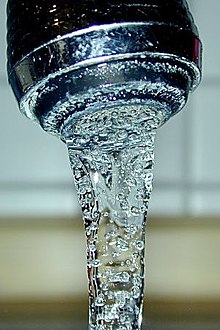|
Water industry
 The water industry provides drinking water[1] and wastewater services (including sewage treatment) to residential, commercial, and industrial sectors of the economy. Typically public utilities operate water supply networks. The water industry does not include manufacturers and suppliers of bottled water, which is part of the beverage production and belongs to the food sector. The water industry includes water engineering, operations, water and wastewater plant construction, equipment supply and specialist water treatment chemicals, among others. The water industry is at the service of other industries, e.g. of the food sector which produces beverages such as bottled water.[2] Organizational structureThere are a variety of organizational structures for the water industry, with countries usually having one dominant traditional structure, which usually changes only gradually over time.[3] Ownership of water infrastructure and operations
Operations
Functions
StandardsWater quality standards and environmental standards relating to wastewater are usually set by national bodies.
Global companiesUsing available data only, and during 2009 - 2010, the ten largest water companies active globally were (largest first) : [7] Veolia Environnement (France), Suez Environnement (France), ITT Corporation (US), United Utilities (UK), Severn Trent (UK), Thames Water (UK), American Water Works Company (US), GE Water (US), Kurita Water Industries (Japan), Nalco Water (US). See also
References
External links
|




